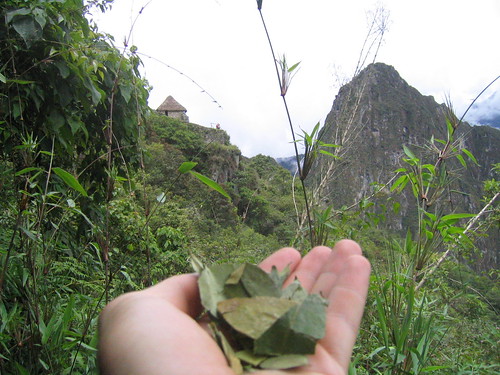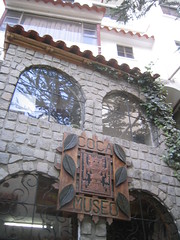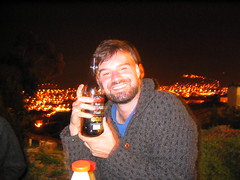
Coca leaves, as it turns out, have been a gift that people in the high Andes mountains have been sharing with travellers since at least 2,500BC. When the leaves are chewed or brewed into a tea they give a bit of an energetic lift not unlike caffeine. It deadens pain, increases endurance, is extremely nutritious, and has scientifically been proven to help adapt to high altitude (and I need all the help I can get). Coca has been a deep rooted part of Andean culture for millenia before even the Incas showed up. It´s a vital part of various spiritual traditions, hospitality and makes a long day working carving stone possible. It certainly wasn´t the only factor, but the little bit of Coca I had tucked under my lip made possible a big green smile when I finally made it to the top.
It also happens to be the raw ingredient of Cocaine, and Cocaine is the primary ingredient of Crack (both of which are many, many times stronger than chewing on a leaf). As just about everyone knows both those addictive and potent drugs have a long sad history of destroying lives but the blame for that can´t be laid on the Andeans nor on the simple Coca leaf. Historically they never bothered to distill out the potent parts of drug for their own use and they don´t barely use it now. It took Europeans to do that. We learned this, and a lot more, visiting the great Coca Museum in downtown La Paz, Bolivia.

We learned that those that first found out about it found it to be a wonderful thing. They added it to wine, to Coca-Cola (the real original recipe) and it blew open a whole new world of pharmaceutical possibilities. Cocaine, it was found, could deaden pain so you could do surgery without whacking your patient over the head or having them drink themselves into a stupor (two widely used options!)

Me preparing for surgery in Cuzco
But by the early 20th century Americans realized that Cocaine addiction was a bad thing for Americans and made it illegal. And it is a bad thing, and I´ve seen enough friends suffer to agree Americans shouldn´t be trusted with readily available cocaine. But then, in the 60s, thanks to US pressure, the UN decided that the Cocaine and the Coca plant (not Cocaine, but the plant!) was bad for whole world and should be eradicated. Oddly enough, its still legal to produce "for industry" only in a few countries that have a history of not being able to handle it. For example, it´s grown in the the US, by the Coca-Cola company for flavoring (yeah, although they took out the cocaine, its still being used for flavoring!) but certainly not for those who´ve used it forever.
And this decree sucks for the folks that have been using it safely and healthfully for well over 4,000 years. Here in the high Andes most people still use Coca, and it´s readily and openly available in street markets all over, but its illegal and a constant battle. In the 80s, for example, during the "War On Drugs," the US loaned Bolivia $millions to destroy ancient Coca farms arrest people. In other words, a corrupt government financed itself by putting its country into debt in a hopeless effort to try to destroy a key part of its culture.
But that all might change. In fact, that all might change in two days! Tyler and I made it to Bolivia a couple days ago and some of you might know that this isn´t exactly the most peaceful place to be. There are presidential elections coming up on the 18th and guy leading in the polls is a local legend called Evo Morales. He is a left wing socialist political firebrand cut from the same cloth as Venezuelas Hugo Chavez or Cubas Fidel Castro and he has definately captured the hearts and minds of Bolivias desperately downtrodden poor majority. And, curiously enough, he is a proud and adamant Coca farmer (advocating for the leaf was a big part of his ride to power). Check out his Coca-friendly website EvoMorales.net (don´t worry, it´s also in English!) to see a level of sincerity that American politics haven´t seen for a century.

Evo Morales
Not surprisingly, he is hated by my government as well as the wealthy folks in his own (read his website, the feeling is clearly mutual). It´s difficult to say what is going to happen on election day. If he is elected, and put in office, some of the wealthiest states are threatening to split off from the country. If he is elected by the people, but not put into office, there is a serious threat that there will be an awful lot of poor people really pissed off. And because the US is leaning so heavily against Evo we´ve been warned that people may take out their anger on Americans (After suffering through a US election stolen in 2000, I may be so sympathetically angry I'll beat up an American! But don´t warn Tyler, I want his beating to be a surprise).
For those of you reading at home, don´t worry, we are being careful. Although a few people did tell us it might be dangerous, far more told us that the Bolivians are wonderful and would take care of us. Nonetheless, we´re making a bee-line for a national park called Inti Wara Yassi to ride out the elections safely in the jungle. When I next write, I´ll let you know how things went!
No comments:
Post a Comment